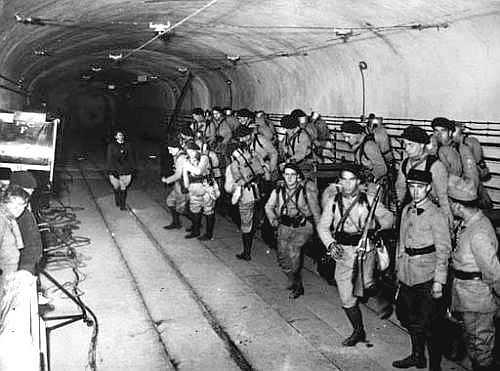
French Forces
"Down on the Maginot Line ..."
?Government of the French Republic
French infantry in one of the Maginot Line's anchor fortresses, late-1930s. Although the facilities in Maginot Line installations could be rather more squalid than this, the Line did present, potentially, a significant obstacle to any German attack on France. This photo was taken in one of the fortresses' communications tunnels, under the massive concrete superstructure. In these installations, the big guns were served by means of small-gauge rail lines; the tracks of one of these is shown here. The Maginot Line has often been criticized as a huge military folly. Perhaps - but it is easy to say this in retrospect. In prospect, from the point of view of the post-WW1 French authorities, it made a certain sort of sense. Given the heavy defensive orientation of their thinking, the idea of creating a reinforced concrete version of the Hindenburg Line facing Germany had attractions. In those cases in which the Line (or its fragmentary western extensions) faced actual German attack, they did present significant obstructions. Unfortunately, this approach was undone by one serious politico-strategic assumption at least. It is also arguable that inadequate allowance was made for the response of the more aggressively-minded Germans in developing counter-bunker weapons and tactics - although this point was never sufficiently tested to judge its importance. The "Maginot" assumption seems to have been related to a number of other assumptions on the part of military planners in France and in the Low Countries that failed, in the end, to mesh. Defensively minded though they were, French military planners, in the early 1920s, would always have assumed that there would be one relatively open flank in which actual victory against the Germans might be achieved (as distinct from mere stasis). That, of course, would of necessity have been north France/Belgium. On the other hand, both Belgium and the Netherlands had defence plans which, they knew, would not stop the Germans, and would rely on delaying the Germans sufficiently to allow their forces to be relieved by the northward advance of the "French steamroller". In strategic "understandings" essentially implicit in nature, the possibility of serious "misunderstandings" is always possible. In this case, it is quite clear that the French assumed that, after dithering typical of her approach to military matters, Belgium would opt for alliance or, at least, potential co-belligerency with France. This would have allowed the French to allow French forces to assist Belgium in constructing "Maginot-lite" fortifications on Belgian territory, and in placing supply and resupply dumps in southern Belgium to be used by an advancing Franco-British army in the event of a German invasion. Thus, the repeated confirmation of strict Belgian neutrality (which continued right down to May, 1940), caused it to dawn on the French that this element of the strategy was simply not going to be realized. As a result, the French were left with what was, from their viewpoint, a vulnerable open flank, just as the Maginot monster was coming towards completion, Consequent efforts to extend the Maginot Line along the long Franco-Belgian border were thus belated, and inhibited by severe budget constraints. Speaking of which - the cost of construction of the Maginot Line had been stupendous. This distorted the French military budget through the 1920s and 1930s, and diverted resources available for military application into concrete, rather into the much more dynamic modernization of the French forces in terms of organization, communications, logistics and technology that, in the event, might have proved more productive. I would not go so far as to say that, had the politico-strategic assumptions underlining the "Maginot approach" played out as expected, the Franco-British forces might have avoided disaster in 1940. It is pretty well certain, however, that they, the Belgians and even the Dutch would have been in a much better position to resist German attack. As matters turned out, the whole French strategy was disastrous. First, the combination of the Maginot line and the Franco-Belgian (mis)understanding signaled clearly to the Germans how the French would fight the 1940 war, with predictable consequences. Secondly, the French fell between the strategy of fixed fortresses and that of open field, which the new German "Blitzkrieg" forces were well-equipped to exploit. Thirdly, the enormous investment of France in the Maginot fortifications (and it really was enormous) not only distorted the pattern of French military expenditure, but of French government expenditure in general, adding yet another element to the fracturing and undermining of the French Third Republic, facilitating its collapse in the event of German invasion, and paving the way for Pétainism. "Put not your faith in Princes"? More a case of "Put not your confidence in concrete ..." Best regards, JR.
4951 Views
5/25/2015
